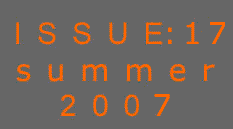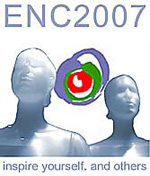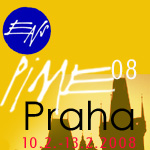ENS NEWS, N° 17:
Raising the political stakes
When asked about what politics meant to him
Albert Einstein replied: “Equations are more important
to me, because politics is for the present, but an equation
is something for
eternity.” Well, if Einstein were around today, with all
the elections that have taken place in Europe recently,
he would have every opportunity to contemplate eternity and to
ignore more mundane considerations like radical political reform
or forming coalition governments. But would he still play down
the importance of politics? Isn’t what happens today
the future of nuclear science?
For some of us, science and politics simply
don’t mix; we prefer to stick to science rather than engage
in the political process. For others, trying to influence the
political debate in order to secure a better deal for science
and research is essential and many of us actively lobby politicians,
state our case and try to influence the political agenda.
The debate about whether science and the Machiavellian arts are
complementary or immiscible is a familiar philosophical one and
we won’t go down that road now. But consider this: the changing
political landscape in Europe could have profound implications
for the future pace and direction of scientific research, development,
education and training. It could greatly influence future generations
of scientists.
A policy rethink on the orientation and funding of research will
affect us all directly. It will redefine priorities, set new
deadlines
and have a great impact upon the context and framework within
which we work. Of course, we are not all natural political
animals,
as Aristotle claimed, but isn’t it better to take part than
observe; to be in motion rather than in inertia? By playing a
more active role in the political process we have a better chance
of making our case heard and refocusing governments’ minds
on priority issues. If we don’t plead our case who will?
We should try and influence things from the inside rather than
observe impassively from the outside. Surely being apolitical
is simply not an option – even for those who doubt they
can have much of an effect? Like it or not, being apolitical is
simply not an option.
So, what are these political events that are
redrawing Europe’s political map? Firstly, the
mandate given by French voters to “citoyen Sarkozy”
is a good thing for the nuclear sector. Any lingering doubts about
France’s commitment to nuclear energy in the event of a
Ségolène Royal victory have been duly dispatched
to a deep underground repository somewhere. The EPR programme
is now sailing in clear blue water.
Across the English Channel, the UK has taken
the radical decision, fired by the pragmatic realisation that
its
own energy
resources are dwindling and that
it must act to achieve its CO2 reduction targets,
to consider a nuclear new build programme. Britain’s new Prime Minister,
Gordon Brown, has lent his support to this, just as his predecessor,
Tony Blair, did. Major players like EDF and Westinghouse
are jockeying for position in order to cash in on lucrative
construction
contracts in the UK.
In Belgium, negotiations are underway for the
forming of a new coalition government. Yves Leterme, the leader
of the Flemish Christina Democrats, is hotly tipped to become
the new Prime Minister and he has already come out in favour
of
reviewing Belgium’s nuclear phase-out policy. But until
the composition of the new government is decided, speculation
about whether Belgium will follow the advice of the Commission
2030 panel of experts and phase out the phase-out will continue.
One thing is certain, though, the science community must makes
itself heard and respected sooner rather than later.
Meanwhile, in pro-nuclear Bulgaria, the first
Balkan MEPs have taken their place in the European Parliament
following a national vote. More pro-nuclear MEPs can have
a greater influence on the political debate in the EU and lead
to greater visibility for nuclear science and research at both
the European and national level.
Speaking of Europe, the re-emergence of nuclear
energy as a key element of the EU’s energy strategy has
led to the creation of a Sustainable Nuclear Energy Technology
Platform (SNETP) and put the Community’s fission research
programme under increased scrutiny. Nuclear energy is no longer
a taboo subject – marginalised outside mainstream political
thinking. The time is right for Europe’s scientific community
to do even more to seize the initiative and cash in on nuclear
energy’s new-found place at the heart of EU energy policy.
With the EU more favourably disposed towards
nuclear energy and more and more governments looking to phase-out
their phase-out policy, expand their nuclear base or go nuclear
for the first time, the premium for cutting edge nuclear science
and research has never been greater. But investing in nuclear
means investing more financial resources in the science that is
needed to fuel and sustain the nuclear renaissance. Greater investment
in human talent – recruiting and supporting current and
future generations of scientists – is also vital if the
nuclear resurgence is to prove really sustainable. These are areas
where we must lead the debate. With a more favourable political
wind blowing across Europe right now and the nuclear revival maintaining
its momentum, we may never have a better chance to thrust science
to the top of politicians’ agenda.
Issue N° 17 kicks off with a word from our
President, who urges scientists to communicate more effectively
with the general public (and don’t forget that the ENS
website is a public one) and rid themselves of the stereotyped
view that they are all dressed in white coats and live in an
intellectual ivory tower, divorced from every reality. Next up
Andrew Teller gives a thought-provoking appraisal of the subtle
difference between evidence and absence.
The events section in this summer’s edition of ENS
NEWS features a teaser on the upcoming ENC2007, in September, in Brussels.
ENS members continue to send in their contributions in ever
growing numbers, which shows the dynamism and motivation of members
and helps keep the nuclear science community up to date with
everything that is going on in our sector. The contributions
this time include a report on the Assisi Symposium on Nuclear
Conversion and Development, a personal view of German Presidency
of the EU from Peter Leister of the Swiss Nuclear Forum, a feature
about the JRC’s new science web portal NUCLEONICA, a report
from Sweden about unusual nuclear reactor concepts, a summary
of what happened at the recent ICAPP conference and a piece about
how new Genitron radio systems are helping to upgrade the safety
monitoring process around Chernobyl’s 30 km exclusion zone.
The Young Generation section contains a glimpse into what the
future holds for young nuclear professionals - as discussed at
this year’s European Young Generation Forum (EYGF), in
Amsterdam; a detailed account of the Czech Young Generation’s
visit to SKODA’s manufacturing facilities, in Pilsen (Czech
Republic) and an early announcement about ENC2008, in Interlaken
(Switzerland.
Finally, the World News section contains the latest edition
of the NEI’s Nuclear Energy Overview newsletter and two
reports from NucNet.
Enjoy ENS NEWS N° 17 and
above all have a lovely summer break!
| 
Mark O’Donovan
Editor-in-Chief
|
|
|




